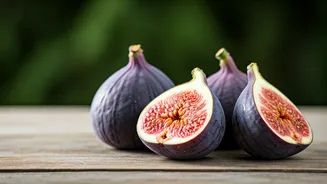Fig's Nutritional Power
Figs, often overlooked, are a treasure trove of vital nutrients. They’re an excellent source of dietary fiber, promoting healthy digestion and regularity.
Fiber is essential for preventing constipation and ensuring the smooth movement of food through your digestive system. Besides fiber, figs are rich in potassium, a mineral crucial for maintaining healthy blood pressure and supporting heart function. Moreover, these fruits contain antioxidants, which help combat free radicals and protect cells from damage. The presence of calcium, iron, and magnesium further adds to the fig's nutritional value, contributing to bone health, oxygen transport, and overall well-being. Incorporating figs into your diet is a simple way to boost your nutrient intake and support various bodily functions.
Fresh Fig Delights
Enjoying fresh figs is a delightful way to experience their natural sweetness and nutritional benefits. You can eat them whole, skin and all, providing a burst of flavor and texture. For a simple and satisfying snack, slice them and pair them with a dollop of yogurt or a sprinkle of nuts, adding protein and healthy fats. Fresh figs also make a wonderful addition to salads. Their sweetness complements savory flavors, creating a balanced and refreshing dish. Try adding sliced figs to your morning oatmeal or cereal for a natural sweetener and an extra dose of fiber. Another easy option is to grill them lightly, enhancing their sweetness and creating a smoky flavor profile. Whether enjoyed on their own or paired with other ingredients, fresh figs are a versatile and delicious treat.
Dried Fig Wonders
Dried figs offer a concentrated form of the fig's nutritional benefits, making them a convenient and shelf-stable option. They are a great source of fiber, helping to improve digestion and prevent constipation, and a high concentration of nutrients. Dried figs can be a powerful snack, providing a quick energy boost and satisfying your sweet cravings. For a more substantial snack, combine dried figs with nuts and seeds, creating a trail mix that's rich in fiber, healthy fats, and protein. Adding dried figs to your baking enhances the flavor and adds a chewy texture to your treats. You can soak dried figs in warm water to rehydrate them, making them softer and easier to incorporate into smoothies or purees. Remember to consume them in moderation, as dried figs are calorie-dense. They’re a convenient way to enjoy the health benefits of figs.
Fig Smoothies & Juices
Smoothies and juices offer a creative way to incorporate figs into your diet, blending them with other nutritious ingredients to create delicious and healthy drinks. Figs add natural sweetness and a creamy texture to smoothies, making them a satisfying and healthy breakfast or snack. You can combine figs with other fruits like bananas, berries, or mangoes, along with a base of milk or yogurt. For a simple smoothie, blend fresh or dried figs with milk and a dash of cinnamon. Add some spinach or kale to increase the nutrient content without affecting the taste too much. Juicing figs is another way to extract their nutrients. Although juicing removes the fiber, you still get a concentrated dose of vitamins and minerals. Make sure to combine the fig juice with other fruits or vegetables to balance the flavor. Experiment with different recipes to find your favorite fig-infused beverage, and make these a regular part of your wellness routine.
Figs with Yogurt
Pairing figs with yogurt is a match made in culinary heaven, combining the sweetness of figs with the probiotics and protein of yogurt for a balanced and nourishing snack or meal. Yogurt provides a creamy texture and beneficial probiotics that aid digestion, supporting gut health. Sliced fresh figs offer a natural sweetness and fibrous texture that complements the tanginess of yogurt. You can also use dried figs, chopped and added to your yogurt for a chewy texture and enhanced flavor. For an extra layer of flavor and crunch, sprinkle some nuts and seeds on top, such as almonds, walnuts, or chia seeds, adding healthy fats and protein. Using different types of yogurt, such as Greek yogurt for a protein boost, or flavored yogurts, like vanilla or honey, can create variety and keep things interesting. This simple combination is a perfect anytime snack, easy to prepare, and a delightful way to enjoy the health benefits of both figs and yogurt.
Figs in Salads
Adding figs to salads introduces a burst of sweetness and a touch of sophistication, making your salads more appealing and nutrient-rich. Figs offer a unique texture and flavor that complements the diverse ingredients of a salad. You can use fresh figs, sliced or quartered, or even grilled for a slightly smoky flavor. Dried figs, chopped and rehydrated slightly, also add a chewy texture and concentrated sweetness. Combine figs with different salad greens, such as spinach, arugula, or mixed greens. Add other fruits like berries, apples, or pears, for a balanced flavor profile. Introduce some nuts like walnuts or pecans for healthy fats and crunch. A simple vinaigrette dressing made with olive oil, balsamic vinegar, and a touch of honey perfectly complements the figs' sweetness. This combination creates a dish that’s both healthy and visually appealing, ensuring you're getting essential nutrients with every bite, as well as a great flavor experience.
Fig-Infused Baking
Figs can transform your baking projects, adding a unique sweetness, texture, and nutritional boost to your favorite treats. Incorporate fresh figs into cakes, muffins, and bread. They add moisture and a subtle sweetness that reduces the need for added sugar. Dried figs, being readily available, are perfect for adding concentrated sweetness and chewiness to cookies, scones, and energy bars. Chop them and add them directly to the batter, or soak them in warm water to soften them before adding. For more elaborate recipes, try making a fig jam or compote to use as a filling in pastries or as a topping for pancakes and waffles. Fig-based desserts often call for spices like cinnamon, nutmeg, and cardamom, which complement the fig's natural sweetness and enhance the overall flavor. By adding figs to your baking, you not only enjoy delicious flavors but also boost the fiber, vitamins, and minerals in your baked creations.
Figs with Cheese
Pairing figs with cheese is a classic combination, offering a perfect balance of sweet and savory flavors, making it a wonderful appetizer or snack option. The natural sweetness of figs complements the savory and creamy textures of various cheeses. Soft cheeses, like brie, goat cheese, or ricotta, pair incredibly well with figs. The contrast in textures and flavors is delightful and satisfying. Hard cheeses, such as Parmesan or aged cheddar, also work well, offering a more robust flavor that complements the sweetness of the fig. You can serve fresh figs with cheese on a platter for guests, creating an elegant appetizer. For a more elevated experience, grill or bake the figs with the cheese to enhance their flavors and textures. Drizzling honey or balsamic glaze over the figs and cheese adds an extra layer of sweetness and complexity. Figs with cheese are not only delicious but also a great way to combine different nutrients and create a satisfying, wholesome snack.
Fig & Nut Combinations
Combining figs with nuts elevates their nutritional value and flavor profile. Nuts add protein, healthy fats, and a satisfying crunch that complements the figs' texture and sweetness. You can enjoy a simple snack by pairing fresh or dried figs with your favorite nuts, such as almonds, walnuts, pecans, or cashews. A handful of figs with a serving of nuts offers a balanced snack, rich in fiber, protein, and healthy fats. Create your own trail mix by combining dried figs, nuts, and seeds. You can add dark chocolate chips for extra flavor. For a more elaborate snack, make fig and nut energy bars or balls, combining figs, nuts, and other ingredients like oats and honey, and roll them into bite-sized treats. The combination of figs and nuts supports healthy digestion and heart health while providing sustained energy. Experiment with different types of nuts and spices to personalize your fig and nut creations.
Figs & Heart Health
Figs play a significant role in promoting heart health due to their rich nutritional profile. They are packed with soluble fiber, which helps lower LDL (bad) cholesterol levels in the blood, reducing the risk of heart disease. The potassium content in figs helps regulate blood pressure, contributing to a healthy cardiovascular system. Figs also contain antioxidants, which combat oxidative stress and protect the heart from damage. Consuming figs regularly can improve overall blood circulation and reduce the risk of blood clots. In addition, the magnesium present in figs helps relax blood vessels, further supporting healthy blood flow. You can incorporate figs into your diet, combined with other heart-healthy foods, to maximize their benefits. By adding figs to your diet, you're not just enjoying a tasty treat but also supporting your heart health and overall well-being.


















